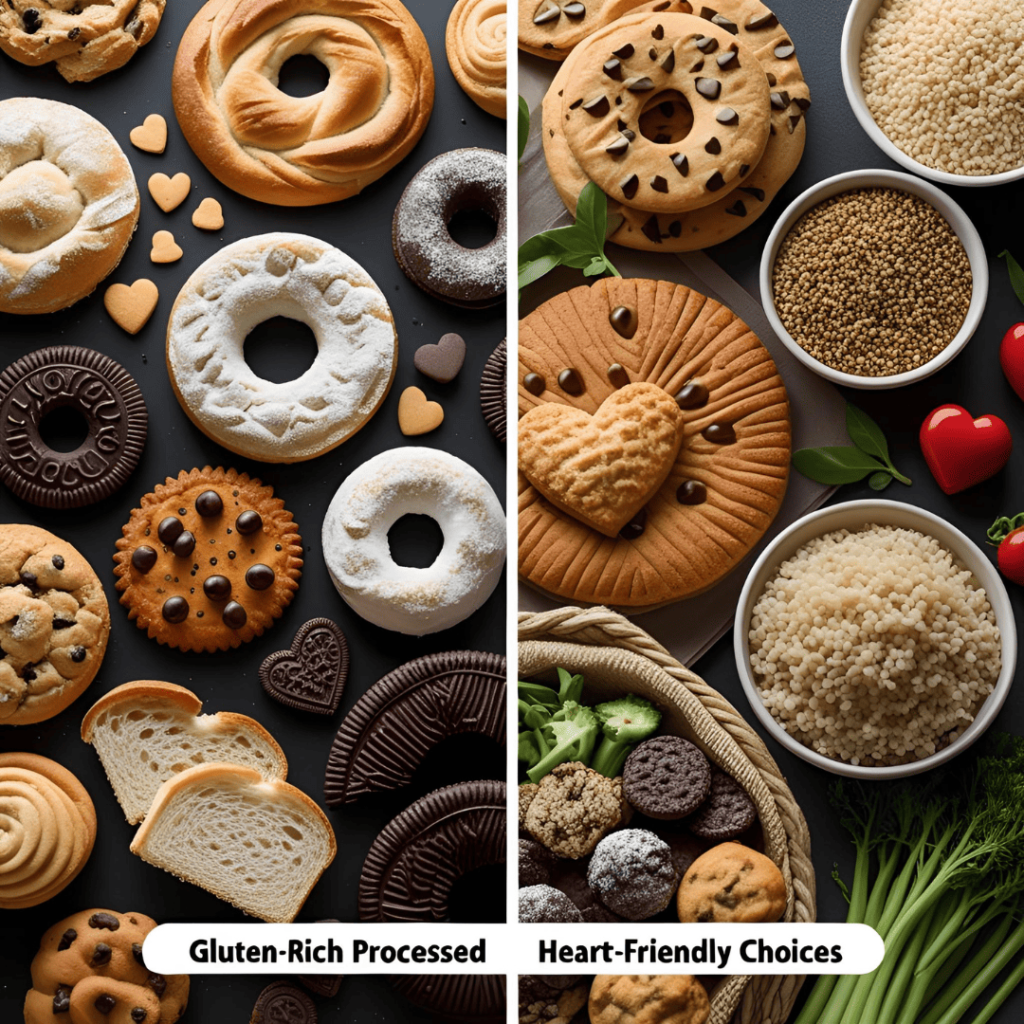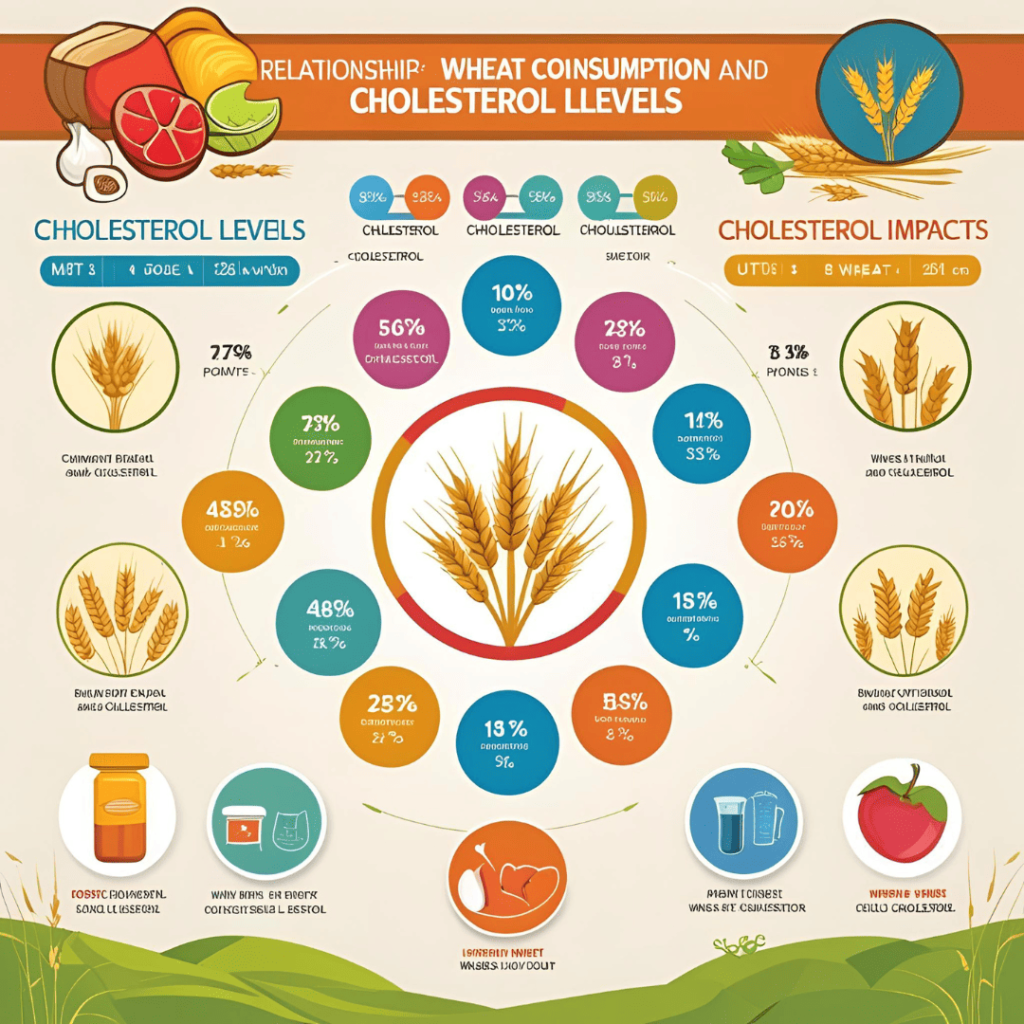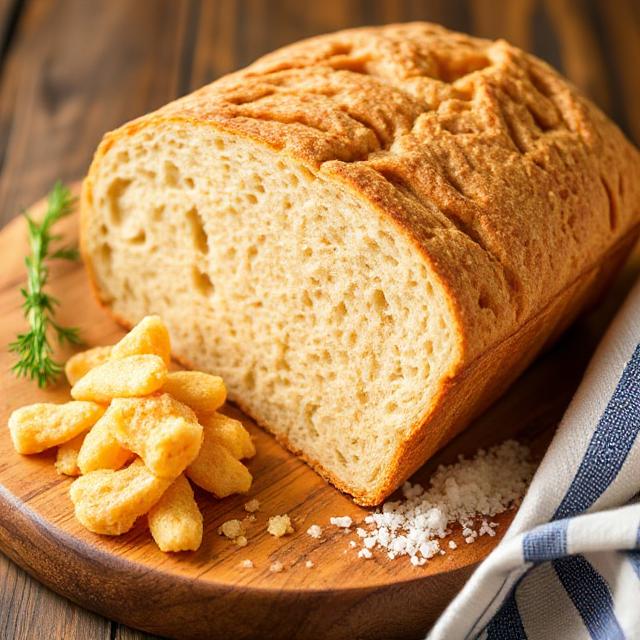Last Updated on June 7, 2025 by Irshad Quadri
Introduction: The Gluten Confusion (Gluten and Heart Health)
In today’s world of health-conscious choices, gluten has become a hot topic. But have you ever stopped to ask, “Does gluten increase cholesterol?” Let’s break it down simply.
Gluten is a protein found in grains like wheat, barley, and rye — the usual suspects behind your everyday bread, pasta, and pastries. While some people avoid it due to celiac disease or gluten sensitivity, others wonder about its broader health impact, especially when it comes to heart health.
Here’s the big question: Could that fluffy roti or buttery toast be sneaky trouble for your cholesterol levels?
With rising concerns about gluten and heart health, it’s important to understand how foods made from wheat may or may not influence your body — particularly your cholesterol. Some even ask, “Is gluten bad for your heart?”, or whether switching to a gluten-free diet for high cholesterol can make a difference.
In this blog, we’ll explore:
- What science says about wheat and cholesterol levels
- Whether gluten itself is the culprit
- And if ditching gluten can really protect your heart
So grab a cup of green tea (or your favorite snack – gluten-free or not 😄), and let’s find out the truth behind gluten and cholesterol. Ready? Let’s jump onto the facts – your heart might thank you later!

Table of Contents
The Truth: Does Gluten Increase Cholesterol? What Science says
Let’s clear up the confusion: Science says there is no direct link between gluten and cholesterol. That means gluten itself doesn’t raise your cholesterol levels. A recent study confirmed that gluten is just a protein found naturally in grains like wheat, barley, and rye — not a cholesterol-raising agent.
So why the concern?
Here’s the catch: many gluten-containing foods like white bread, cakes, pasta, and bakery treats are highly processed. These processed foods are loaded with refined carbs, unhealthy fats, and added sugars — all of which can indirectly raise your LDL cholesterol (a.k.a. the “bad” kind).
Translation? It’s not the gluten doing the damage… it’s the junk it often tags along with!
Gluten + Processed = Trouble?
When you frequently eat gluten-rich processed foods, your body starts reacting to the extra calories, saturated fats, and sugars. Over time, this can contribute to higher cholesterol levels and may put your heart health at risk.
That’s why people often confuse gluten with being harmful — when really, it’s the unhealthy food choices causing the problem.
✅ Should You Go Gluten-Free?
Unless you have celiac disease or gluten intolerance, there’s no medical reason to avoid gluten. In fact, whole grains that contain gluten (like whole wheat or barley) are full of fiber, B vitamins, and other nutrients that support heart health.
However, if your goal is to lower cholesterol, a healthy lifestyle matters more:
- Choose whole foods over processed snacks
- Eat more fruits, veggies, and healthy fats
- Stay active and hydrated
So, does gluten increase cholesterol? Not directly. But the processed, fatty, sugary foods with gluten might. The real villain isn’t gluten — it’s our modern diet choices.
Quick Recap:
- Gluten doesn’t raise cholesterol by itself
- Processed gluten foods can cause trouble
- Focus on balanced eating, not gluten elimination
- Go gluten-free only if you’re intolerant or have celiac disease

How Gluten Indirectly Affects Your Heart and Cholesterol
While gluten may not directly spike your cholesterol, its indirect impact on heart health is worth paying attention to. Let’s break it down.
Many gluten-rich foods — think bread, pastries, cookies, and packaged snacks — are highly processed. These foods usually come loaded with refined carbs, bad fats, and added sugars. And when we eat them in excess, it can lead to chronic inflammation in the body.
👉 What’s the problem with inflammation?
Inflammation plays a major role in plaque buildup in arteries, which increases the risk of heart disease. So, while gluten itself isn’t the enemy, the junk food that often carries it can stir up trouble.
Gluten and Gut Health: The Hidden Link to Cholesterol
There’s more to the story. For many people, gluten can irritate the gut, especially if they’re sensitive to it. Symptoms like bloating, gas, or stomach pain could be signs that gluten is increasing gut inflammation.
Now here’s the twist: Your gut and liver are best friends. If your gut is inflamed, your body might not regulate cholesterol metabolism properly. Poor gut health = poor cholesterol balance = possible risk to your heart health.
Real-Life Case Studies
Below are 2 real-life case studies which will be very helpful to you:
Effects of a Gluten-Free Diet on Blood Lipids
A client with no history of gluten sensitivity or abnormal cholesterol levels developed significant gastrointestinal discomfort. Upon medical evaluation, abnormal blood lipid levels were detected. After eliminating gluten from her diet, she experienced notable improvements in both digestive symptoms and cholesterol levels within two months.
Read the full case study here: Effects of a Gluten-Free Diet on Blood Lipids: A Case Study
3 weeks gluten-free diet results in decreased cholesterol levels
Additionally, a study conducted by the Rowett Institute of Nutrition and Health at Aberdeen University found that participants following a gluten-free diet for three weeks experienced decreased cholesterol levels, among other health benefits.
Learn more about the study here: University Finds Gluten-Free Diet Can Lead to Lower Cholesterol and More Fiber
These examples underscore the potential positive impact of a gluten-free diet on cholesterol and digestive health, especially when gluten-containing processed foods are replaced with whole, nutrient-dense alternatives.
✅ Final Thoughts
So, does gluten increase cholesterol? Not directly. But if your diet is full of gluten-loaded processed foods, the combo of inflammation, gut imbalance, and poor cholesterol regulation can create a perfect storm for heart problems.
🫀 If you feel gluten might be affecting your body, especially your digestive system or cholesterol, it’s smart to listen to your body. Swap processed snacks for whole, heart-friendly foods — your gut, heart, and cholesterol will thank you.
Wheat and Cholesterol Levels: What’s the Real Connection?

There’s a lot of confusion about the link between wheat and cholesterol, and many people believe wheat is the main culprit behind rising cholesterol levels. However that’s not completely true. The key lies in understanding the difference between whole wheat and refined wheat. Whole wheat is packed with fiber, vitamins, and minerals that actually support heart health. On the other hand, refined wheat — like white bread, cookies, and other bakery items — is stripped of its fiber and loaded with added sugars and unhealthy fats, which can spike your blood sugar and raise your LDL (bad cholesterol) levels.
Refined wheat products are often processed with trans fats and saturated fats, which not only increase bad cholesterol but also reduce HDL (good cholesterol) — a double risk for your heart. If your goal is to lower cholesterol naturally, then ditch the refined stuff and include more whole grains in your meals. Whole wheat, millets, oats, and brown rice are rich in soluble fiber, which binds cholesterol and flushes it out of your body. Plus, they keep you full longer, preventing junk food cravings.
So, wheat itself is not the villain — the real problem lies in how it’s processed. Stick to whole wheat and minimally processed grains, avoid refined wheat foods, and support your heart with a balanced, fiber-rich diet. Combine this with regular exercise, and you’re on the right track to healthier cholesterol levels and a happy heart! ❤️
Is a Gluten-Free Diet Really Heart-Healthy?
A lot of people ask: “Is a gluten-free diet good for the heart?” The answer isn’t a simple yes or no — because it depends on what kind of gluten-free foods you’re eating.
Let’s break this myth with some solid facts.
Not All Gluten-Free Foods Are Healthy
Just because a product is labeled gluten-free doesn’t mean it’s good for your cholesterol or heart health. In fact, many gluten-free snacks — like chips, cookies, packaged breads, and energy bars — are often loaded with:
- Refined carbs
- Added sugars
- Unhealthy fats
These are the same culprits that raise LDL cholesterol and increase the risk of plaque buildup in arteries. So yes, gluten-free junk food is still junk food — no health bonus here.
Gluten-Free ≠ Automatically Heart-Healthy
Many people believe that a gluten-free diet automatically supports heart health. But if you’re replacing regular processed food with gluten-free processed food, you’re just swapping one problem for another.
Whether it’s traditional or gluten-free, processed junk is still high in:
- Trans fats
- Saturated fats
- Hidden sugars
These ingredients don’t care about labels — they clog arteries and can lead to high cholesterol either way.
Read the Labels Like a Pro
If you’re buying gluten-free products, train yourself to read nutrition labels and ingredient lists. Here’s what to look for to protect your heart:
✅ Low in saturated and trans fats
✅ High in fiber
✅ Low in added sugars
✅ Low in sodium and refined carbs
✅ Choose low-fat and high-nutrient options
Remember: your goal isn’t just to avoid gluten — it’s to eat smarter for your cholesterol and heart health.
What Should a Heart-Healthy Gluten-Free Diet Look Like?
If you’re going gluten-free, go all-in the right way. Focus on wholesome, natural, and minimally processed foods like:
- Fresh fruits and vegetables
- Gluten-free whole grains (like quinoa, millet, brown rice)
- Lean proteins (chicken, fish, tofu)
- Nuts and seeds (great for healthy fats)
- Low-fat dairy or plant-based alternatives
This kind of diet helps reduce bad cholesterol, supports gut health, and keeps your heart strong.
Researches
NIH Studies about Wheat Gluten
WebMD Good & Bad Foods for High Cholesterol
For a more in-depth understanding, you might explore additional resources:
Harvard Health: Think twice before going gluten-free
Cambridge University Press: Impact of gluten-free diet on cardiovascular risk factors
✅ Final Word
So, does gluten increase cholesterol? Not directly — but gluten-packed junk food or even gluten-free ultra-processed snacks definitely can. A gluten-free diet is only heart-healthy when it’s packed with natural, nutrient-rich foods — not sugar-loaded, fatty, fake “health” snacks.
Bottom line: Gluten-free is not a health badge. It’s your overall diet that makes or breaks your cholesterol and heart health.
Is a Gluten-Free Diet Enough to Lower Cholesterol?
If you’re trying to lower your cholesterol, going gluten-free might sound like a smart move. But here’s the truth: just avoiding gluten isn’t enough — your overall diet still needs to be heart-friendly to actually make a difference.
Let’s break it down.
Gluten-Free Foods That Actually Help Lower Cholesterol
Not all gluten-free foods are created equal. If you’re choosing the right ones, they can truly support your heart health. Here are some gluten-free superfoods that help manage cholesterol levels:
✅ Quinoa – A gluten-free complete protein rich in fiber, perfect for balanced meals
✅ Brown rice – High in nutrients and better than refined white rice
✅ Gluten-free oats – Help improve digestion and reduce LDL cholesterol (bad cholesterol)
All three are packed with fiber, which binds to cholesterol and helps flush it out of your body. Fiber = your heart’s best friend ❤️
✅ Tips to Make Your Gluten-Free Diet Truly Heart-Healthy
If you’re eating gluten-free cookies and chips thinking they’re healthy — plot twist — you might still be harming your heart. Here’s how to do it right:
- Eat more whole foods: fresh fruits, veggies, and gluten-free whole grains
- Add good fats: avocado, olive oil, nuts, seeds
- Choose lean proteins: fish (rich in omega-3s), chicken, tofu, lentils
- Limit processed snacks: especially those high in sugar, sodium, and hidden trans fats
- Cut down on sweets: too much sugar = higher blood fats & pressure
- Watch your portions: even healthy foods in excess can increase calories
1-Day Heart-Friendly Gluten-Free Meal Plan
Want a headstart? Here’s a simple gluten-free meal plan that supports both cholesterol control and heart health:
🕖 Breakfast:
Gluten-free oats with honey, mixed nuts, and fresh fruits
🕛 Lunch:
Brown rice with grilled vegetables + baked chicken or fish
🕒 Snack:
A fruit + handful of almonds, walnuts, or pumpkin seeds
🌙 Dinner:
Salad with leafy greens, carrots, beetroot, avocado, + grilled tofu or paneer
This plan is loaded with fiber, healthy fats, and lean proteins — everything your heart (and tastebuds) will love. 💚
Final Thoughts
So, does a gluten-free diet help reduce cholesterol? Yes — but only when it’s packed with natural, unprocessed, heart-healthy foods. Just skipping gluten won’t do much unless you’re also saying goodbye to sugary snacks and hello to wholesome nutrition.
Eat clean, eat smart, and make every gluten-free meal count for your heart.
FAQs – Is Gluten Bad for your heart? ❤️
1. Is wheat bad for cholesterol?
Wheat, especially refined wheat products, can contribute to higher cholesterol levels if consumed excessively, due to their refined carbs and low fiber content. Whole wheat and whole grains are healthier options that can help manage cholesterol.
2. Should I stop gluten if I have high cholesterol?
Not necessarily. Gluten itself doesn’t impact cholesterol levels directly. Focus on reducing processed, high-fat gluten foods and include heart-healthy, gluten-free options instead.
3. What are healthy gluten-free grains for the heart?
Quinoa, brown rice, gluten-free oats, amaranth, millet, and buckwheat are excellent grains that support heart health due to their high fiber and nutrient content.
4. Is going gluten-free necessary for heart patients?
Only if you have gluten intolerance or celiac disease. For most heart patients, a balanced diet rich in fiber, healthy fats, and whole grains is more important than simply avoiding gluten.
5. Can gluten-free foods help lower cholesterol?
Yes, especially if they are high in fiber (like oats and quinoa). Choosing minimally processed gluten-free foods can support cholesterol management.
6. Are all gluten-free processed foods unhealthy?
No, but many processed gluten-free foods contain added sugars and unhealthy fats. Always read labels and choose whole, natural gluten-free options.
7. How can I effectively manage cholesterol through diet?
Incorporate high-fiber foods, healthy fats, lean proteins, and limit saturated fats, trans fats, and sugars. Regular exercise and lifestyle changes are also crucial.
8. Do I need supplements if I switch to a gluten-free diet for heart health?
Not necessarily. Most nutrients can be obtained from a balanced diet. Consult a healthcare provider before taking supplements.
9. Can gluten-free diets cause nutritional deficiencies?
Yes, if not carefully planned, they can lead to deficiencies in fiber, B-vitamins, and minerals. Ensure your diet includes a variety of nutrient-rich gluten-free foods.
10. Is gluten-free more expensive than regular foods?
Often, yes, due to the cost of specialty products. Focus on naturally gluten-free, whole foods to keep costs down and health benefits high.
Final Thoughts: Gluten Is Not the Villain—Processed Food Is
Let’s clear the confusion once and for all — gluten itself is not the enemy. The real danger lies in those processed and packaged foods that often come loaded with unhealthy fats, added sugars, preservatives, and zero nutrition.
People often blame gluten for heart health issues, but the real problem is highly processed foods that raise your cholesterol and trigger inflammation.
✅ To become Gluten-free is not the solution,
👉 Real solution is: shift to natural, wholesome, gluten-free foods like:
- Quinoa
- Brown rice
- Millets
- Gluten-free oats
- Seeds and nuts
These superfoods not only help control cholesterol, but they also improve digestion, boost immunity and support overall heart health.
Struggling with What to Eat? Try Our Free AI-Based Diet Planner!
Agar aap confuse ho ki kaunse foods cholesterol-friendly hain, ya apne liye ek heart-healthy gluten-free diet plan banana mushkil lagta hai — toh no worries! 🎯
Try out our Free AI-Based Diet Planner — designed specially to:
✅ Create personalized meal plans based on your age, weight, and health goals
✅ Suggest heart-friendly, gluten-free, and nutritious meals
✅ Help manage cholesterol levels naturally and effectively
✅ Reduce the daily stress of what to cook or eat
This planner is your digital nutrition buddy — making your journey to better heart health simple, sustainable, and super convenient!
Try our Free AI Workout Generator
Also our Free AI Cholesterol Friendly Meal Planner
✅ Conclusion: Be Smart, Not Just Gluten-Free
So next time someone asks “Does gluten increase cholesterol?” — you’ll know the answer. It’s not about gluten alone, it’s about the quality of your food choices.
Go beyond the gluten-free label — eat real, fiber-rich, whole foods and make mindful choices for a healthier heart.
Remember: Healthy eating starts with knowledge + smart tools. Let our AI Diet Planner guide you toward a better, cholesterol-friendly lifestyle.
Try it today and take the first step toward your heart-smart transformation!
My Recommendation: Maxi Health – Cholesterol Gummies
Why This Product?
- Gluten-Free & Kosher: Perfect for individuals seeking gluten-free options.
- Contains 1200mg of Plant Sterols & Stanols: These compounds are known to support healthy cholesterol levels.
- User-Friendly Form: Gummies are a convenient and enjoyable alternative to pills.
- Positive Reviews: Highly rated by users for taste and effectiveness.
Note: Always consult with a healthcare professional before starting any new supplement regimen.
Related Articles You’ll Love
Gluten-Free Cholesterol Lowering Foods for Diabetics
Learn which gluten-free foods help manage both cholesterol and blood sugar—perfect for heart and diabetic care.
Gluten-Free Oats and Beyond: 7 Surprising Foods to Lower Cholesterol Naturally
Discover science-backed, gluten-free foods (not just oats!) that can lower LDL cholesterol effectively.
Gluten-Free Fiber Sources That Help Reduce Cholesterol Levels
Fiber is key! This post lists gluten-free, high-fiber foods that clean your arteries and boost heart health.
10 Best Low-Carb Low-Cholesterol Breakfast Ideas
Start your day with gluten-free, heart-friendly breakfast options that keep cholesterol in check.
3-Day Gluten-Free Meal Plan to Lower Cholesterol
Get a full sample plan for 3 days—ideal for anyone looking to lower cholesterol with gluten-free meals.
Affiliate Disclosure
This blog contains affiliate links, meaning I may earn a small commission if you purchase through these links, at no extra cost to you. I only recommend products I trust and believe will benefit my readers. Your support helps keep this site running—thank you! 🙌

About the Author
Irshad Quadri is a Health & Wellness blogger who simplifies topics like cholesterol management, weight loss, and heart health for everyday readers. On iq4u81.blog, he shares science-backed diet tips, easy recipes, and practical guides to help people live healthier — without losing the joy of food.

